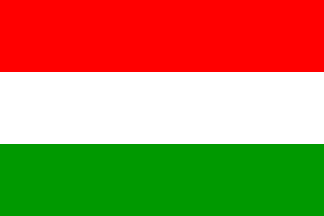 klaus-michael schneider
klaus-michael schneider
Keywords: canar | azogues |
Links: FOTW homepage | search | disclaimer and copyright | write us | mirrors

Last modified: 2021-08-26 by  klaus-michael schneider
klaus-michael schneider
Keywords: canar | azogues |
Links: FOTW homepage |
search |
disclaimer and copyright |
write us |
mirrors

official flag
image by Ivan Sache, 11 October 2008

reported plain flag
image by Ivan Sache, 11 October 2008
Parish:
See also:
Other Sites:
Azogues flag at Turismo
Azogues site (defunct). The flag consists of three horizontal
bars (red-white-green), symbolizing courage, purity and hope.
Azogues is the capital of Canar Province
and has c. 11.000 inhabitants.
Jarig Bakker , 14 July 1999
Flag, Coat of Arms and legislation at Consejo
Provincial del Cañar site. Adoption date is 22 July 1948.
Falko Schmidt, 26 November 2003
The municipality was formed on 21 April 1825.
Translated from Consejo
Provincial del Cañar site: "
"In 1930, the Organization Committee of the Celebration of
the Fiftieth Aniversary of the Creation of the Province of Cañar
commissioned Dr. Aurelio Jaramillo Rodas and Emilio Izquierdo
Toledo to design a coat of arms for the town of Azogues. After
validation by Dr. Honorato Vázquez, the proposal was presented
to the Municipal Council on 3 November 1930 and accepted as the
municipal coat of arms. The coat of arms started to be officially
used some 70 years ago. The municipal flag was adopted in 1948.
Municipal Decree of 22 July 1948.
Article 1.
The coat of arms of Azogues is in proportions 7:5 and divided per
saltire into four quarters. The background of the upper quarter
is gules, expressing strength and victory, the dexter of the
quarter showing a sun with 16 rays, alternating straight and
wavy, symbolizing liberty and kindness characteristic of the
inhabitants. In the same quarters is shown in center the Castillo
of Ingapirca [Ingapirca is the best preserved Inca monument in
Ecuador, built on an earlier Cañari sanctuary; the
Temple of the Sun is locally called Castillo.
The Cañaris were the aborigenes of the today's
provinces of Azuay and Cañar, who were submitted by the Incas.
The province of Cañar, originally named after the capital,
Azogues, was renamed as a tribute to the Cañaris. I.S.], a Inca
monument which has been majestuously standing for centuries in
the parish of the same name; on the fort stands Guacamaya, the
mythologic bird of the Cañaris [The guacamayas
are known as macaws (genus Ara Lacépède).
I.S.], symbolizing liberty. The two lateral quarters are or,
symbolizing wealth and consistency; the dexter quarter is charged
with an open book, synthetizing knowledge and science of this
privileged land, that gave genius such as Luis Cordero [Luis
Cordero Crespo (1883-1912), born in Déleg, President of Ecuador
(1892-1895), also the author of poems in Spanish and Quechua and
of the first Quechua-Spanish-Quechua in Ecuador.I.S.], Juan
Bautista Vázquez, Julio Matovelle, Benigno Malo, José Maria
Rodríguez Parra, Pedro López de Argudo, Mariano Vintimilla,
Pío Bravo, Coronel Juan Francisco Carrasco, Juan Bautista
Dávila Heredia, Luis Antonio Cárdenas, Aurelio Bayas Martínez,
Miguel Heredia Rodas, Emilio Abad, and others. The
sinister quarter is charged with a muscled arm holding a hammer,
symbolyzing work and honesty; this allegory is surrounded by a
branch of laurel and a branch of Panamá hat palm" (Carduluvica
palmata [Should be Carludovica palmata Ruiz &
Pav.I.S.]), symbolizing the victories obtained by the sons of
Cañar in science, art and industry. The lower quarter is azure,
the attribute of justice and beauty, with on the right the Abuga
mountain, on the left river Cojitambo and in the middle one of
the peaks of the Buerán cordillera, from which flows a water
stream representing river Burgay.
Article 2.
This coat of arms shall be displayed in a dedicated location of
the Acts' Room of the Town Hall and in the departments of the
Council, as well it shall be used in the official correspondence
Article 3.
The flag of the canton is made of three longitudinal stripes
equal in proportions, the first being red, the second, in the
middle, white, and the last, green; the middle stripe is charged
with the coat of arms described above.
Article 4.
The proportions of the flag are 3 x 2 and its colour symbolize:
red, valour; white, integrity and purity; and green, hope and
dedication.
Article 5.
This Decree supersedes the Municipal Decree on the flag adopted
by the Municipal Council on 7 August 1947.
Article 6.
This Decree on the coat of arms and flag has effect
starting on the day of its proclamation."
Accordingly, the official municipal flag shall be in proportions
2:3, with the coat of arms in the middle, in spite of being
shown, graphically, without the coat of arms on the very same
page giving the text of the Decree. The exact size of the coat of
arms is not stated. The choice of the proportions of the flag on
the image at Turismo
Azogues site (defunct) seems to be arbitrary.
Ivan Sache, 11 October 2008
f-azo.jpg)
image from Consejo
Provincial del Cañar site, located by Falko Schmidt,
26 November 2003